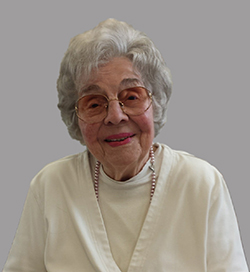By Louis A. Zona
YOUNGSTOWN, Ohio – The recent passing of a dear friend, Eleanor Beecher Flad, brought great sadness to me and to countless others in our community.
It’s difficult to find an institution or organization that Eleanor’s generous spirit has not touched. In addition to her selfless nature, she was smart, athletic and quite humorous. It was her sense of humor that endeared her to many.
Eleanor realized that she was blessed with family wealth, which she used to improve our community; she loved it so much. Her mother and father were a part of that generation of industrialists who built Youngstown into one of the great industrial centers of America. Her mother led the campaign to sell war bonds in America’s effort to defeat Nazism and Fascism during the Second World War.

Eleanor never used her family’s wealth to social climb. Rather she chose to make a difference by contributing to the good work of the late Sister Jerome Cochran and other community agencies dedicated to fighting poverty. She also realized that cultural and educational entities such as the Youngstown Symphony, Stambaugh Auditorium, the Mahoning Valley Historical Society, Youngstown State University and the Butler Institute of American Art were in need of funds to carry on their many worthwhile programs. Thus she came to the aid of not only these institutions but also dozens more.
As for The Butler, the physical plant has grown thanks in major part to Eleanor’s generosity. Most people know of the beautiful Beecher Court where so many museum and community events take place. But then there’s The Beecher Center, devoted to kinetic art and art based in technology, Flad exhibition galleries that represent new artistic media and various works of art contributed to the permanent collection of the museum.
Two favorite stories connected with Beecher Court come to mind. One day I received a call from Eleanor when she proposed that we purchase a portrait of her mother to be placed in the newly completed Beecher Court.
I suggested this was a perfect opportunity to add a significant work of art to the collection and not a work done by a portraitist. Thus I recommended an artist of national reputation, Philip Pearlstein, to paint her mother, Florence.
Eleanor’s sons Erle and Ward recognized the artist and the fact that Pearlstein was known primarily for his nudes. I reassured them that the artist would not paint Mrs. Beecher in the altogether. In fact, he came to Youngstown and painted Florence in her favorite dress and on her favorite chair.
The painting was typical of Philip Pearlstein’s style. It was a wonderful depiction of Eleanor’s mother.
In celebration of the portrait, Eleanor decided that we should have an official unveiling. Eleanor wheeled her mother’s wheelchair in front of the veiled portrait. Eleanor then gave us the OK to remove the curtain.
Florence looked at the portrait and said with disgust, “Eleanor, that’s the ugliest thing I ever saw. I don’t look anything like that!”
“Mother,” Eleanor responded, “you look exactly like that!” The now famous portrait by the great Philip Pearlstein of Eleanor’s mom hangs in Beecher Court at The Butler.
One day Eleanor and I were standing in Beecher Court awaiting the architect who designed the court, Gary Balog. As Gary approached us, I observed (and said) that he had probably the best hair in Youngstown and that I wished that I had Gary’s hair.
Eleanor looked at me and asked, “What would you do with it?”
The Butler usually sponsored an annual art tour to New York City that Eleanor always attended. One day she and I were walking along Broadway when all of a sudden Eleanor disappeared.
I looked back and saw that she had stepped in a hole and was seated on the sidewalk, waving at me and wearing a big grin. As I helped her up, she continued the conversation as if nothing had happened.
One day Eleanor came into my office with a book of the writings and sayings of Will Rogers. She had circled one particular comment by Rogers that meant a great deal to her. It reads, “Strangers are just friends that I haven’t met yet.“
To me that caught the essence of Eleanor Beecher Flad’s life that was dedicated to helping others.
Diversity was a word that Eleanor knew well. On every board on which she served, she made the case that boards of trustees should reflect the makeup of a community.
I sat in on many meetings where Eleanor emphasized the idea that minorities, particularly individuals of color, should be included on every decision-making board in the community. And she meant it!
She was a terrific athlete who taught her boys Ward and Erle how to excel at skiing and how to dominate on the tennis court.
Her late husband, professor Bill Flad, enjoyed amateur athletics, particularly college-related sports. He and Eleanor would occasionally drive an entire class of business students to Pittsburgh to see a Pirates game instead of requiring attendance in class that particular day.
And did I tell you that she loved to fish? She had the greatest fish tales you’d ever want to hear.
Eleanor never forgot my birthday. She always had a gift for me and I’ve kept every one, from a ceramic frog with a baseball in his mouth to a baseball bat with a flashlight attached. She handed the bat to me with the advice that I spot a potential backyard intruder with the light and then crack him on the head with the barrel of the bat if he didn’t want to leave.
She faithfully listened to radio talk show host Rush Limbaugh, who at one point, was selling ties that he designed. Guess who received a Rush Limbaugh tie for his birthday?
She remarked that for a guy as conservative as Limbaugh, he surely designed the craziest ties in the world. To this day I treasure that zany tie Eleanor gave me – purple, red yellow and all!
